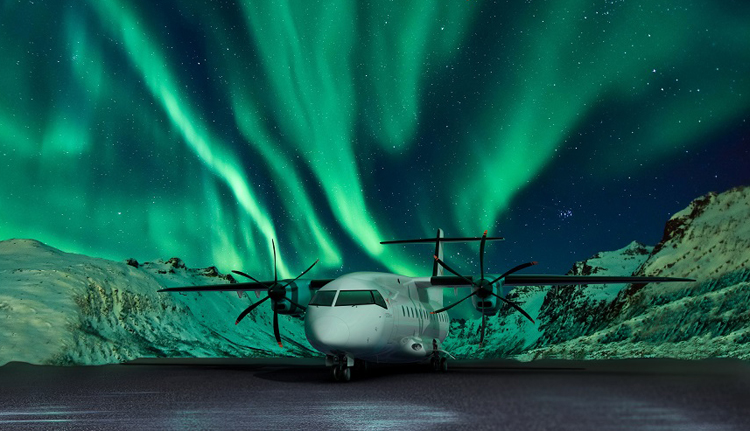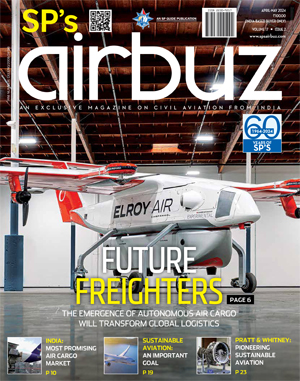Aviation and energy industry progress on their joint path towards climate-neutral aviation for Northern Norway
- Northern Norway disposes of abundant, low-cost renewable energy and the necessary infrastructure to ramp up production of low-carbon e-fuels (“Power-to-Liquid PtL”).
- Sustainable Aviation Fuels (SAF) will play a key role in reducing the climate impact of the aviation industry on a global scale.
- Deutsche Aircraft is at the forefront of reducing aviation’s impact on climate by developing an energy- and cost-efficient turboprop aircraft that is able to operate on 100% SAF including PtL.

German aircraft manufacturer Deutsche Aircraft, Energi i Nord (North Energy Cluster) and Bodø Airport Development Company (BLU) have met with energy and aviation industry stakeholders to address how the supply, demand and production of near carbon-neutral synthetic aviation fuels could be ramped up for operators in Northern Norway. As airlines need to ensure their future fuel supply comes from sustainable sources, fuel manufacturers need offtake guarantees and the regulatory framework to secure the immense investments necessary to build a whole new fuel ecosystem. To take immediate action to reach climate goals, the collaboration between industry and politics is essential. Northern Norway is a vast and secluded territory which has a network of 26 regional airports that are critical for the region’s transportation infrastructure. The region also has an excess of low-cost renewable energy that is key for e-fuel production, which makes it the ideal testing ground for the development of new concepts to reach climate-neutral aviation.
Cooperation towards sustainable e-fuels
Deutsche Aircraft and Energi i Nord have been collaborating successfully for more than a year to promote e-fuels using industrial CO2 point sources as a first step, which will later be substituted by direct air capture powered by abundant renewable energy to minimise lifecycle emissions.
By exploring flight testing opportunities and studying ground infrastructure requirements to produce e-fuels, this partnership paves the way towards Northern Norway becoming a national and international leader in the enormous transformation aviation is facing. The cluster also collaborates with the Lofoten – The Green Islands 2030 project, an ambitious roadmap to set a scenic and untouched island community on a course to becoming fully carbon neutral, including its tourism sector. Short-haul routes within the Lofoten archipelago will be among the first to be operated with alternative fuels.
Deutsche Aircraft is developing its new regional 40-seater turboprop, the D328eco™, that will be compatible with 100% SAF including e-fuels. Powered by state-of-the-art technologies, it will achieve near carbon-neutral flights from its entry into service, with low operating costs and excellent performance. Beyond the D328eco, Deutsche Aircraft is also studying alternative propulsion technologies based on hydrogen for future aircraft programs.
Energi i Nord is comprised of industrial players such as major wind and hydropower producers, technology suppliers and electrochemical companies, as well as members of the aviation sector and local communities that are determined to take the lead energy transition.
It has several ongoing projects in green aviation and has cooperated closely with aviation industries in Germany, France and Iceland. At present, Energi i Nord is conducting a study mapping the potential for the use and production of e-fuels in Northern Norway and in Iceland in cooperation with Icelandic partners.
Regina Pouzolz, Director Sustainability at Deutsche Aircraft, highlighted the importance of PtL fuels for reducing the climate impact of aviation. “Aviation’s climate impact depends on both CO2 and non-CO2 effects, both of which are minimised by PtL. Climate change asks for substantial and fast solutions in the aviation sector. While hydrogen aircraft may be an interesting solution in the farther future, our climate cannot afford to wait for these technologies to achieve the maturity that is required to perform safe and cost-efficient flights. PtL fuels that have been produced from renewable energy can bring the CO2 balance to almost zero. They reduce the impact of contrails, and they improve local air quality because they naturally do not hold aromatics and produce less soot. At the same time, changes to the aircraft and infrastructure are reasonable. Enabling the already efficient D328eco turboprop to fly with any type of SAF is the biggest and fastest leap on our path to climate-neutral aviation.”
“We have the best possible ecosystem in Northern Norway to make low carbon e-fuels a reality," says Anders Tørud, Project Manager Green Aviation at Energi i Nord. “E-fuels and hydrogen produced from renewable energies are the most promising scalable solutions to significantly reduce emissions in aviation, one of the most hard-to-abate sectors. To make it happen, it is essential to bring down production costs through scale. We have the right ecosystem in Northern Norway to do so,” he adds.
According to Marc Siegel, Senior Manager Marketing at Sasol ecoFT, “Size matters. The bigger the plant, the more efficient it is. Integrated processes and industrial facilities further increase efficiencies and therefore the sustainability of novel technologies,” he says.
“It is crucial to find, solve and develop more solutions to reduce emissions in the aviation industry. Our partnership with Deutsche Aircraft and Energi i Nord is our answer, in the short and medium term, as well as long term,” says Elnar Holmen, CEO Bodø Airport Development Company.





